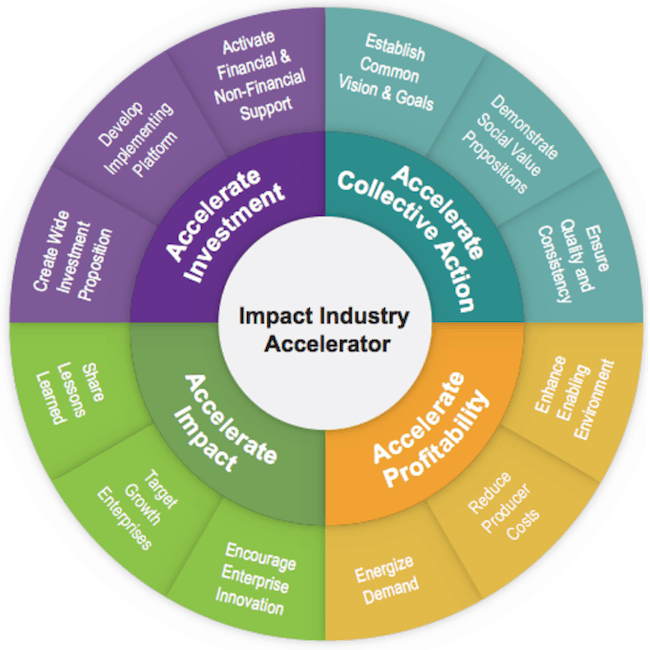‘Build, Test, Respond’: How Lean Testing Enables Organizations to De-Risk Their Scaling Strategies — And Accelerate Their Impact
Whether you work in a social enterprise or a non-profit organization, we all aspire to create an organizational culture that fosters agility and enables us to learn from failure. “Fail fast, fail often” is just as common a mantra in the non-profit space as it is in the business world. But it’s not easy to practice this principle in the “non-profit industrial complex,” with its donor-restricted plans, short-term funding cycles, and cumbersome measurement and evaluation processes. And for-profit social enterprises face many of the same challenges.
At Spring Impact, we’ve seen that lean testing represents the best possible method for the non-profit and social enterprise sectors to learn, build and implement strategies for impact at scale. As the name suggests, lean testing involves working through the cycle of “build, test, respond” as quickly as possible, dramatically increasing an organization’s ability to learn and adapt to change. While lean testing can be a new mindset and way of working for enterprises and non-profits, the results can be so powerful that it becomes part of an organization’s DNA over time.
Lean testing works hand in hand with long-term strategy
Spring Impact focuses on helping mission-driven organizations to achieve impact at scale, and a core part of this is co-designing scale strategies. But we realized that we couldn’t support organizations’ efforts to scale through strategy alone. Bringing a group of people together in a room to set goals, build roadmaps and design pilots — a typical approach to strategy design — simply doesn’t work without a means to test fundamental assumptions. So we invested in building a lean testing practice three years ago, working with Ann Mei Chang, author of Lean Impact and a leading expert on social innovation.
Fortunately, lean testing is by no means the enemy of long-term strategy. Organizations cannot run lean tests without having both a deep understanding of the problem they are trying to solve, and a clear impact goal. Strategy lays the foundations, ensures common understanding and provides a direction for how to get from point A to point B. Lean testing provides a method to test and validate assumptions over the course of the journey.
Case study: The Able Trust
Our recent collaboration with The Able Trust shows how lean testing supports organizations’ efforts to optimize their strategy and unlock impact at scale.
The Able Trust is a non-profit organization that aims to transform employment inclusion for Floridians with disabilities. With a labor force participation rate of only 20.4%, people living with disabilities in Florida face a huge employment gap compared to their peers without disabilities, whose labor force participation rate is over 40 percentage points higher. There is an unacceptable lack of inclusion in the state’s workforce, despite roughly 500,000 unfilled job opportunities (as of early 2023).
The Able Trust team wanted to use lean testing to hypothesize, learn and iterate on their strategy to tackle this problem, and they turned to Spring Impact for help. We coached them through over 10 tests to learn about a range of assumptions, solutions and partnerships. In one test, we created a mock website for The Able Trust, to see if employers were willing to commit their time and money in exchange for solutions to their hiring needs. In under two weeks, it became clear that this approach — i.e., reaching out to employers individually — wouldn’t be sustainable, and The Able Trust decided to quickly pivot to reach employers through partnerships with business associations instead.
In another test, The Able Trust ran an in-person information session to explore the assumption that employers would be more likely to hire people living with disabilities, if given a safe space to ask vulnerable questions about the best way to include and support these employees. Less than a day later, the organization had data validating in-person information sessions as a cost-effective strategy to de-stigmatize these inclusive employment practices.
Through lean testing, The Able Trust improved their success rate in recruiting new employment support service providers from 40% to over 90%, tripled their employer engagement rate and revised their payer model to be financially sustainable. They also used lean test results to make big strategic pivots, including deepening their partnership with Florida’s Division of Vocational Rehabilitation and revamping the channel strategy they were using to reach employers. According to Joey D’Souza, VP of External Engagement: “Spring Impact [kept] us from failing big and expensively. … I’ve never learned so much about something in such a short amount of time, as going through this process.”
Using lean testing to de-risk strategy
The Able Trust is not an outlier among the organizations we’ve worked with. To take another example, we helped Mastercard Foundation use lean testing to de-risk a new fund that accelerates youth employment in Ghana. In order to test whether their fund’s recruitment strategy is inclusive of entrepreneurs based in rural and low-income communities, the Mastercard Foundation team created a test application they disseminated through a limited number of existing channel partners. Just a handful of weeks later, their team had real-world insights they used to change the application questions and recruitment strategy, making it more inclusive of entrepreneurs without reliable access to the internet, or past experience applying to funds.
Similarly, we worked with Communities In Schools — a non-profit that leverages community resources to empower students to succeed in school — to use lean testing to de-risk their scale strategy. One of their core assumptions was that U.S. school districts would be able to cover the costs for their integrated student support program at scale, but they needed to validate that this was in fact the case. So they pulled together a short pitch deck, including annual costs, and shared it with a handful of school district leaders through one-on-one interviews. The candid insights and reactions they received from those calls showed that school districts were able to pay, but their leaders needed help convincing their departments. So Communities In Schools quickly reprioritized their research agenda to highlight data points that help school district leaders make the case for investment.
Conclusion: don’t debate, test
We see more and more funders and organizations that want to build and strengthen their lean testing capacities for impact at scale, and we are growing our lean testing practice globally to amplify these tools and methods. As Allison Chase, President and CEO of The Able Trust stated: “This has turned out even better than I ever expected. … Some of the things that I thought for sure were going to be the right solutions weren’t. And we changed and iterated.”
Time and money are all too scarce in the non-profit and social enterprise worlds: Lean testing is the best method to ensure these resources are spent wisely.
Amy Ragsdale is Director of Lean Innovation, United States, and Emma Colenbrander is Managing Director, United Kingdom at Spring Impact.
Photo courtesy of Christina @ wocintechchat.com.
- Categories
- Social Enterprise



